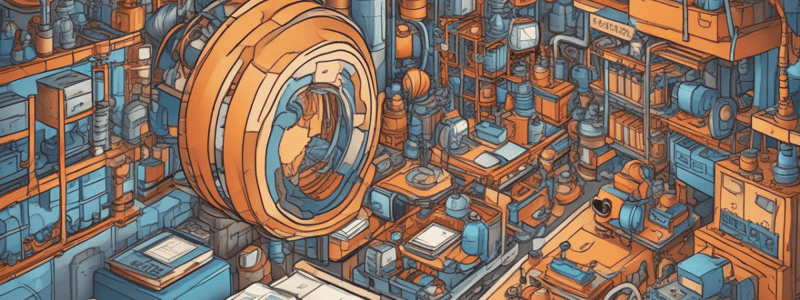Podcast
Questions and Answers
Where did the concept of Quality Control emerge as a distinct discipline?
Where did the concept of Quality Control emerge as a distinct discipline?
- United States (correct)
- Europe
- United Kingdom
- Japan
Who developed the philosophy of Total Quality Management (TQM) in Japan in the 1960s?
Who developed the philosophy of Total Quality Management (TQM) in Japan in the 1960s?
- Unknown Academicians
- Dr. W. Edward Deming only
- Dr. W. Edward Deming and Dr. J.M. Juran (correct)
- Dr. J.M. Juran only
What is a key element of Total Quality Management (TQM)?
What is a key element of Total Quality Management (TQM)?
- Root Cause Corrective Actions for select employees
- Quality Measurement only for Managers
- Periodic Quality Audits
- Universal Quality Responsibility (correct)
When did western companies start to introduce their own quality initiatives, following Japan's success in employing quality issues?
When did western companies start to introduce their own quality initiatives, following Japan's success in employing quality issues?
What is the focus of Total Quality Management (TQM)?
What is the focus of Total Quality Management (TQM)?
What is a characteristic of TQM?
What is a characteristic of TQM?
What is the primary goal of Quality Control?
What is the primary goal of Quality Control?
What is the definition of 'Quality'?
What is the definition of 'Quality'?
What is the main difference between Quality Control and Inspection?
What is the main difference between Quality Control and Inspection?
What is the characteristic that determines the 'good quality' of a component?
What is the characteristic that determines the 'good quality' of a component?
What is the purpose of Quality Control?
What is the purpose of Quality Control?
What is Quality?
What is Quality?
What are the factors that affect the quality of a product?
What are the factors that affect the quality of a product?
What is the ultimate goal of Quality Control?
What is the ultimate goal of Quality Control?
What is the primary objective of Quality Control?
What is the primary objective of Quality Control?
Who defined Quality Control as 'that Industrial management technique means of which products of uniform accepted quality are manufactured'?
Who defined Quality Control as 'that Industrial management technique means of which products of uniform accepted quality are manufactured'?
What is one of the factors that affect the quality of a product?
What is one of the factors that affect the quality of a product?
What is the primary function of a Quality Control Department?
What is the primary function of a Quality Control Department?
What is one of the advantages of Quality Control?
What is one of the advantages of Quality Control?
What is the definition of Total Quality Management (TQM) according to the International Organization for Standardization (ISO)?
What is the definition of Total Quality Management (TQM) according to the International Organization for Standardization (ISO)?
What is the primary objective of Total Quality Management (TQM)?
What is the primary objective of Total Quality Management (TQM)?
What is one of the paradigms of Total Quality Management (TQM)?
What is one of the paradigms of Total Quality Management (TQM)?
What is the primary benefit of Total Quality Management (TQM)?
What is the primary benefit of Total Quality Management (TQM)?
What is the focus of Total Quality Management (TQM)?
What is the focus of Total Quality Management (TQM)?
Flashcards are hidden until you start studying
Study Notes
Definition of Quality
- Quality is closely allied to cost and customer needs.
- Quality is defined as fitness for purpose at lowest cost.
- It is the ‘totality of features and characteristics’ that satisfy both explicit and implicit customer needs.
- Quality is a degree of perfection and can be judged or realized by comparing with standards.
Quality Control
- Quality Control is a systematic control of various factors that affect the quality of the product.
- It includes material, tools, machines, labor, working conditions, and measuring instruments.
- Quality Control ensures that the operation will produce the optimum quality products at minimum cost.
- It is concerned with making things right rather than discovering and rejecting those made wrong.
Factors Affecting Quality
- Men, materials, machines, and manufacturing conditions affect product quality.
- Additional factors include market research, money, management, and production methods and product design.
Objectives of Quality Control
- To decide on the standard of quality that is easily acceptable to the customer and economical to maintain.
- To improve the standard of quality of the product.
- To solve any deviations in the quality of the product during manufacturing.
- To ensure that only products of uniform and standard quality are sold.
Functions of Quality Control Department
- To suggest methods to prevent manufacturing difficulties.
- To reject defective goods.
- To find out where control is breaking down and investigate the causes.
- To correct rejected goods, if possible.
Advantages of Quality Control
- Improved product quality increases sales.
- Scrap rejection and rework are minimized, reducing waste and manufacturing costs.
- Good quality products improve reputation.
- Inspection costs are reduced.
- Uniformity in quality can be achieved.
- Manufacturer and consumer relations are improved.
Total Quality Management (TQM)
- TQM is a management strategy aimed at embedding awareness of quality in all organizational processes.
- It involves the entire organization, supply chain, and/or product life cycle.
- TQM is composed of three paradigms: Total, Quality, and Management.
- It is defined as both a philosophy and a set of guiding principles that represent the foundation of a continuously improving organization.
Origin and Evolution of TQM
- The concept of Quality Control emerged in the United States in 1920.
- The philosophy of TQM was developed in Japan in the 1960s by Dr. W. Edward Deming and Dr. J.M. Juran.
- In the 1980s to 1990s, a new phase of quality control and management began, known as Total Quality Management (TQM).
Elements of TQM
- Sustained management commitment to quality.
- Total focus on the customer.
- Preventing rather than detecting defects.
- Universal quality responsibility.
- Quality measurement.
- Continuous improvement.
- Root cause corrective actions.
- Employees' involvement and empowerment.
Studying That Suits You
Use AI to generate personalized quizzes and flashcards to suit your learning preferences.




